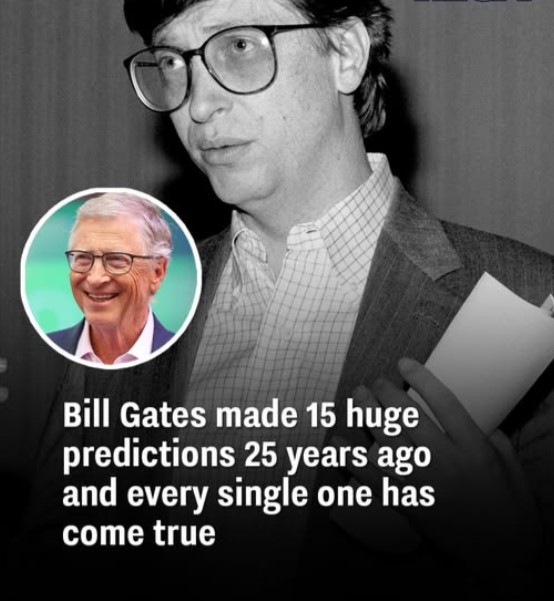Bill Gates’ 15 Predictions from 1999 That Have All Come True
In 1999, Microsoft co-founder Bill Gates published Business @ the Speed of Thought, where he presented 15 bold predictions about the future of technology. Remarkably, each one has proven accurate over time. His foresight into the digital transformation of everyday life has become increasingly evident in today’s interconnected world.

1. Automated Price Comparison Services
Gates anticipated the emergence of tools that would allow consumers to instantly compare prices across multiple websites, helping them find the best deals with ease. This is now a common feature of online shopping experiences.
2. Mobile Devices
He predicted that individuals would carry compact devices capable of keeping them informed, connected, and productive. This vision is realized through smartphones and smartwatches, which serve as essential tools for communication, news, entertainment, and commerce.
3. Online Payments and Healthcare
Gates foresaw a world in which people would conduct financial transactions and communicate with healthcare providers via the internet—now a widespread reality thanks to digital banking and telehealth platforms.
4. Personal Assistants and the Internet of Things (IoT)
He envisioned digital assistants that would coordinate devices, deliver relevant information, and adapt to individual habits. Virtual assistants and smart home systems now offer this kind of integrated support.
5. Home Monitoring via Video Feeds
The idea of real-time home surveillance with alert capabilities was one of Gates’ predictions. Video doorbells and home security systems today provide homeowners with constant monitoring and immediate notifications.
6. Social Networking Platforms
He foresaw private online spaces where individuals could communicate and plan events. Social networks have since become a cornerstone of modern communication.
7. Tailored Promotions for Travel
Gates predicted that booking systems would offer customized recommendations for destinations, lodging, and local activities. This has become standard practice in the travel industry.
8. Real-Time Sports Discussion Platforms
He imagined platforms where people could discuss live sports events and participate in interactive contests. These types of services now thrive during sporting broadcasts.
9. Smart Advertising Based on Behavior
Gates predicted that advertising would be personalized through data tracking. Today’s targeted ads are crafted using sophisticated algorithms that analyze consumer behavior and preferences.
10. Interactive TV Content and Links
He envisioned television programs linking viewers to supplementary information online. This is now common practice through QR codes, social media prompts, and live content links.
11. Online Forums for Civic Engagement
Gates foresaw online discussions centered around politics, city planning, and local news. Community forums and public comment platforms have brought this vision to life.
12. Online Communities Based on Interests
Rather than geographic proximity, Gates predicted communities would form online around shared interests. This is evident in the widespread use of topic-specific forums and social groups.
13. Project Management Tools for Team Building
He anticipated systems that would help managers assemble teams based on project needs and individual skills. Many collaborative software solutions now offer these capabilities.
14. Online Job Marketplaces
Gates predicted job seekers would find employment through digital platforms by sharing their qualifications and interests. This is now the norm in professional networking and recruitment.
15. Business Networking Platforms
Finally, Gates foresaw platforms where businesses could bid for projects and offer services globally. This has become a foundational model for the freelance and outsourcing industries.
